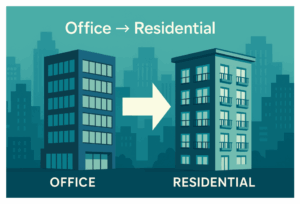Introduction
If you’ve ever dabbled in real estate investment, development, or even just looked into purchasing a property, you’ve likely come across the term ‘zoning laws.’ Zoning laws are the regulatory backbone that governs land use across cities and municipalities in the United States. But how do these laws come into existence, and more importantly, how can you find information about the zoning laws that affect your property? This comprehensive guide by Renew Realty aims to answer all of your questions and more. Buckle up; this is going to be a detailed ride.
Why Zoning Laws Matter
Why should you, as a property investor or homeowner, care about zoning laws? The answer is simple but has far-reaching implications. Zoning laws determine what you can and cannot do with your property. Want to build a multi-story commercial complex? You’ll need to check if the zoning laws allow for commercial activity in that area. Planning to divide your large property into multiple smaller lots? Zoning laws have a say in that too. From the perspective of community development, zoning laws help maintain a balance. They keep industrial areas away from residential zones, ensure that public services like schools and parks are evenly distributed, and much more.
Understanding the Basics of Zoning Laws
Zoning laws or zoning ordinances are sets of regulatory measures that dictate the land use within a specific geographic area. These laws are usually enacted and enforced by local government bodies and can vary widely from one jurisdiction to another. The primary purpose of zoning laws is to segregate different types of land use that might be incompatible. For instance, you wouldn’t want a noisy manufacturing plant located next to a quiet residential neighborhood.
Zoning laws came into existence in the early 20th century, primarily to control the rapid urbanization and to ensure more organized growth. Over time, these laws have become increasingly complex, incorporating various types of zones and sub-zones, each with its own set of permissible land uses and restrictions. (Insert link to historical overview of zoning laws)
The Impact of Zoning Laws
Understanding the zoning laws applicable to a particular piece of land can significantly impact its value and utility. For example, a residentially zoned property will generally have a higher value if it is also permitted for commercial use, as this increases the ways in which the property can generate income. On the flip side, strict zoning laws can also adversely affect property values. For instance, if a property is zoned only for agricultural use, it may limit the revenue-generating opportunities, thereby reducing its market value.
Beyond property values, zoning laws also have a broader impact on community development. They play a critical role in city planning, influencing where schools, hospitals, parks, and other public services are located. They also help in the conservation of natural resources by restricting land use in environmentally sensitive areas.
Types of Zoning Laws
Zoning laws can be categorized into various types based on the kind of land use they regulate. Understanding these categories is crucial for any property owner or developer. Here’s an in-depth look at the different types of zoning laws you’ll commonly encounter.
Residential Zoning
Residential zoning is perhaps the most common type of zoning you’ll encounter. These zones are designated for residential buildings such as single-family homes, multi-family homes, townhouses, and sometimes even mobile homes and trailer parks. Residential zoning laws often specify the types of homes that can be built, including their sizes, heights, and proximity to other structures. They may also include restrictions on non-residential uses like home businesses.
Commercial Zoning
Commercial zones are areas designated for business activities. These can range from small retail stores and restaurants to large office buildings and shopping centers. Commercial zoning laws often specify the types of businesses that can operate in these zones and may include limitations on hours of operation, parking spaces, and other operational aspects. It’s crucial to check the specific sub-categories of commercial zoning as not all commercial activities may be permitted in every commercial zone.
Industrial Zoning
Industrial zones are designed for manufacturing, warehousing, and other heavy industrial activities. These zones are typically located away from residential and commercial areas due to the noise, traffic, and environmental concerns associated with industrial activities. Industrial zoning laws often have strict regulations concerning waste disposal, noise levels, and even the architectural design of the buildings.
Agricultural Zoning
Agricultural zones are areas designated primarily for farming and agriculture-related activities. These zones may also allow for some residential dwellings, but commercial and industrial uses are generally restricted. Agricultural zoning laws aim to protect farmlands from being converted into urban areas and to preserve the rural character of these regions.
Mixed-Use Zoning
Mixed-use zones are a relatively modern development in zoning laws that allow for a combination of residential, commercial, and sometimes even industrial uses in the same area. These zones aim to create more integrated and functional communities where people can live, work, and shop in close proximity. Mixed-use zoning often comes with specific guidelines to ensure a harmonious coexistence of different land uses.
How Zoning Laws Are Made
Understanding how zoning laws are created can give you valuable insights into why they exist in the first place. Zoning laws are usually enacted by local governments, although there are instances where state or federal laws may also play a role. Here’s a look at the process.
Role of Local Government
Local governments are the primary entities responsible for creating and enforcing zoning laws. This is usually done through a local planning commission or a similar body. These organizations conduct studies, hold public hearings, and work on drafting the zoning ordinances.
Role of Planning Commissions
Planning commissions are specialized bodies within local governments tasked with overseeing land use and zoning. They often consist of experts in urban planning, architecture, and other related fields. Planning commissions are responsible for creating detailed zoning plans, which are then subjected to public hearings for feedback.
Public Hearings and Community Input
Before any zoning law is enacted, it is usually subjected to public hearings where members of the community can voice their opinions and concerns. This is an essential step in the legislative process as it ensures that the laws are not only technically sound but also socially acceptable.
How to Find Your Local Zoning Laws
Finding the zoning laws applicable to a particular property or area is often the first step in any real estate investment or development process. While this may seem like a daunting task, there are multiple resources available to help you. Here’s how you can go about it.
Online Resources
The internet has made it incredibly easy to find information about zoning laws. Most local government websites offer detailed zoning maps and ordinances that you can download. Some websites even have interactive maps that allow you to click on specific parcels of land to view their zoning information. (Insert links to popular online resources)
Government Archives
If you’re looking for historical zoning information or want to conduct a more in-depth research, government archives can be a valuable resource. These archives often contain old zoning maps, legislative records, and other documents that can give you a better understanding of how zoning laws have evolved over time.
Public Libraries
Don’t underestimate the power of a good old-fashioned library. Public libraries often have sections dedicated to local government and planning, where you can find zoning maps, city plans, and other relevant documents. Librarians can also guide you to the right resources, making your research process much easier.
County Clerk’s Office
The county clerk’s office is another reliable source for zoning information. They maintain public records, including land deeds, which often contain zoning information. Visiting the county clerk’s office can provide you with official and up-to-date zoning maps and ordinances.
Real Estate Databases
There are various online real estate databases that provide zoning information as part of their property listings. Websites like Zillow, Redfin, and others often include this information, making it easier for you to find what you’re looking for without diving into government websites or archives.(Insert links to U.S. real estate databases that offer zoning information)
Contacting Real Estate Professionals
Sometimes, the easiest way to find zoning information is to consult with real estate professionals. Real estate agents, lawyers, and planners often have access to detailed zoning maps and can provide you with personalized advice based on your specific needs. This can save you a lot of time and effort in the long run.
Case Studies
Understanding zoning laws in theory is one thing, but seeing them in action can provide you with invaluable insights. Let’s look at some real-world examples of how zoning laws have impacted various projects and communities.
Example 1: Zoning Law Changes and Their Impact
Imagine a scenario where a small town decided to rezone a particular area from residential to commercial. This change had a ripple effect on the community. Property values for homes near the newly commercial zone increased due to the potential for commercial development. However, the change also led to increased traffic and a change in the community’s character, leading to mixed reactions from the residents.
Example 2: Zoning Laws in Major U.S. Cities
Zoning laws in major U.S. cities like New York, San Francisco, and Chicago are incredibly complex due to the diverse needs of large populations and the limited availability of land. These cities often have multiple layers of zoning that include not only land use but also building heights, setbacks, and even aesthetic considerations. Navigating these complex laws requires a deep understanding of local ordinances and often the assistance of legal professionals.
Public Libraries
Don’t underestimate the value of your local public library as a resource for zoning information. Many libraries have local government documents, historical maps, and other resources that can be incredibly useful. Libraries often provide free access to online databases that might otherwise require a subscription, offering another avenue for your research.
County Clerk’s Office
The county clerk’s office is another valuable resource for finding zoning laws and land use regulations. This office maintains public records, including property deeds, which often contain zoning information. Visiting the county clerk’s office can provide you with official documents that are useful for legal proceedings or in-depth research.
Real Estate Databases
There are various online databases and services that provide comprehensive real estate data, including zoning information. Websites like Zillow, Redfin, and others sometimes include zoning details in their property listings. While this information is usually accurate, it’s always a good idea to cross-reference it with official sources. (Insert links to popular real estate databases)
Contacting Real Estate Professionals
Real estate agents, brokers, and other professionals in the field can be a quick and reliable source for zoning information. They often have access to specialized databases and have the experience to interpret zoning laws effectively. However, it’s essential to consult multiple sources to confirm the information you receive.
Case Studies
Understanding the theory behind zoning laws is one thing, but seeing them in action can provide invaluable insights. In this section, we’ll look at some real-world case studies that illustrate the impact of zoning laws on property development and community planning.
Example 1: Zoning Law Changes and Their Impact
One of the most dramatic examples of zoning law impact can be seen in cities that have undergone rapid gentrification. In such cases, zoning laws are often updated to accommodate new types of land use, leading to significant shifts in property values and community demographics. These changes can both positively and negatively affect existing residents, making it a topic of ongoing debate.
Example 2: Specific Zoning Laws in Major U.S. Cities
Major cities like New York, San Francisco, and Chicago have complex zoning laws that have evolved over decades or even centuries. Understanding these laws requires a deep dive into various zoning categories, sub-categories, and special zones like historic districts or environmental protection zones. Studying these cities can offer a comprehensive view of how zoning laws can shape the development of large, complex urban environments.
Misconceptions About Zoning Laws
Zoning laws are often misunderstood, leading to misconceptions that can result in legal issues or poor investment decisions. In this section, we’ll debunk some of the most common myths surrounding zoning laws.
Myth 1: Zoning Laws Are the Same Everywhere
One of the most common misconceptions is that zoning laws are universal. In reality, zoning laws can vary significantly between states, counties, and even within the same city. Always make sure to check the local zoning ordinances for the most accurate and specific information.
Myth 2: Zoning Laws Are Permanent
Another prevalent myth is that zoning laws are set in stone. While it’s true that changing a zoning law can be a lengthy and complicated process, it’s not impossible. Zoning laws are subject to revisions and amendments, often in response to shifts in community needs or urban development trends.
Myth 3: Residential Zones Are Only for Homes
Many people believe that residential zones are strictly for residential buildings. While it’s true that the primary land use in these zones is residential, there are often allowances for other types of land use like parks, schools, and sometimes even small businesses.
Legal Pitfalls to Avoid
Navigating the complex landscape of zoning laws can be tricky, and mistakes can be costly. Here are some legal pitfalls to avoid when dealing with zoning issues.
Failing to Verify Zoning Laws
One of the most common mistakes is failing to verify the zoning laws applicable to a specific property. Never rely solely on word-of-mouth or unofficial sources. Always consult the local zoning office or other reliable resources to confirm the zoning status of a property.
Assuming Non-Conforming Uses Are Illegal
Properties that were developed before the enactment of current zoning laws and don’t conform to them are often termed ‘non-conforming uses.’ While these uses are generally allowed to continue, there may be restrictions on expanding or altering the property. Always check the specific rules regarding non-conforming uses in your area.
Navigating Zoning Restrictions
Even if your property falls under certain zoning restrictions, there are legal avenues to navigate these limitations. Here’s how you can go about it.
Applying for a Zoning Change
If you believe that the current zoning laws affecting your property should be changed, you can apply for a zoning amendment. This process involves filing an application with your local planning commission and may require you to present your case in public hearings. While obtaining a zoning change is challenging, it’s not impossible, especially if you can demonstrate that the change will benefit the community.
Variances and Permits
In some cases, you may not need to change the zoning law but can seek a variance or special permit for your project. Variances allow for a one-time exception to the zoning law, while special permits are more flexible but often come with conditions that must be met. Both processes require approval from local authorities and may involve public hearings.
How Renew Realty Can Help
Understanding and navigating zoning laws can be a complex and daunting task. That’s where Renew Realty comes in. With our expertise in zoning laws and real estate investment, we can help you make informed decisions.
Expertise in Zoning Laws
Our team of experts at Renew Realty is well-versed in the intricacies of zoning laws across various jurisdictions. Whether you’re looking to invest in residential, commercial, or industrial properties, we can provide you with the zoning information you need to make a sound investment.
Navigating Complex Cases
Dealing with zoning issues often involves navigating a maze of legal and bureaucratic obstacles. Renew Realty can guide you through this process, from identifying the applicable zoning laws to assisting with applications for zoning changes, variances, or special permits.
Personalized Consultation Services
Every property is unique, and so are its zoning requirements. At Renew Realty, we offer personalized consultation services to address your specific needs. Our goal is to provide you with accurate and understandable data, so you can make the best possible investment decisions.
Conclusion
Zoning laws are an essential aspect of real estate that every investor, developer, and property owner should understand. This comprehensive guide aims to equip you with the knowledge and resources you need to navigate the complex landscape of zoning laws effectively. Remember, when in doubt, don’t hesitate to reach out to professionals like Renew Realty for guidance.




